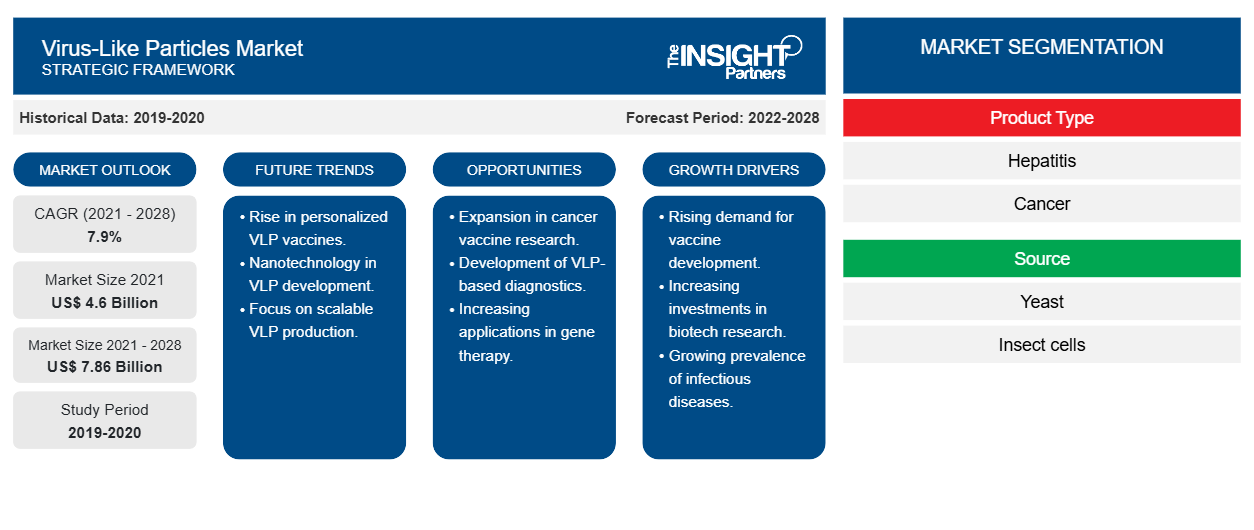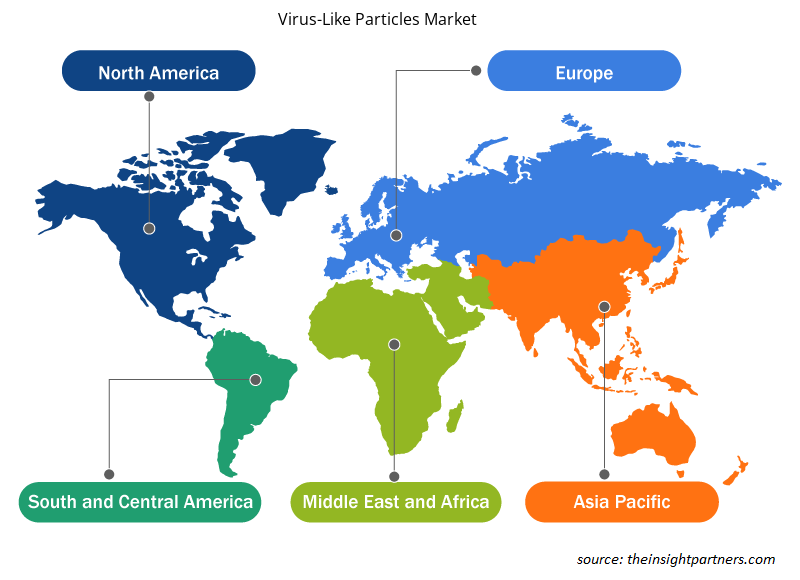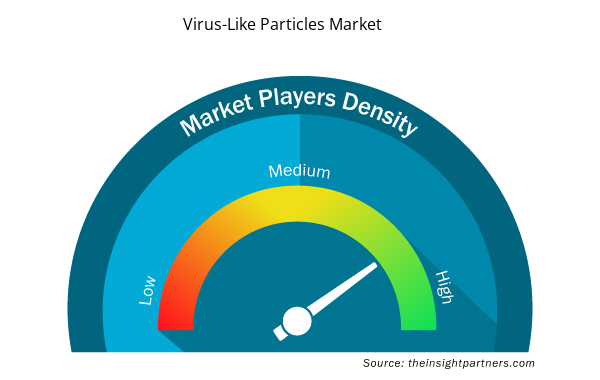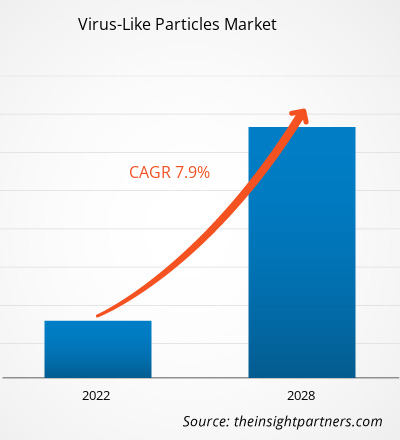The virus-like particles (VLP’s) market is projected to reach US$ 7,858.82 million by 2028 from US$ 4,601.84 million in 2021; it is expected to grow at a CAGR of 7.9% from 2021 to 2028.
The commercialization of virus-like particles -based vaccines against human and animal viruses, vigorous research and development activities for the development of virus-like particles -based viral vaccines, and virus-like particles emerging as a reliable immunotherapy platform for allergic diseases are the key driving factors responsible for the overall market growth. However, technical challenges related to the design, purification, and storage of eVLPs impede the overall market growth. Additionally, complexities associated with the manufacturing of virus-like particles vaccines, coupled with excess cost and time requirement of processes (such as downstream processing for virus-like particles -based vaccines), further limit the global market growth. Furthermore, virus-like particles -based therapeutics intended for topical and emerging viral diseases as well as cancer are still under development, which is posing lucrative opportunities for the overall market growth.
North America is likely to continue its dominance in the virus-like particles market during 2021–2028. The US holds the largest share of the market in North American and is expected to continue this trend during the forecast period. This is primarily attributed to commonly observed susceptibility of people toward viral infections, such as viral influenza caused by different variants. Moreover, continuous R&D activities required for the manufacturing of live attenuated vaccines compels biopharmaceutical companies to opt for virus-like particle’s, which further supports the market growth.
Customize This Report To Suit Your Requirement
You will get customization on any report - free of charge - including parts of this report, or country-level analysis, Excel Data pack, as well as avail great offers and discounts for start-ups & universities
Virus-Like Particles Market: Strategic Insights

- Get Top Key Market Trends of this report.This FREE sample will include data analysis, ranging from market trends to estimates and forecasts.
You will get customization on any report - free of charge - including parts of this report, or country-level analysis, Excel Data pack, as well as avail great offers and discounts for start-ups & universities
Virus-Like Particles Market: Strategic Insights

- Get Top Key Market Trends of this report.This FREE sample will include data analysis, ranging from market trends to estimates and forecasts.
Market Insights
Commercialized virus-like particles based Vaccines drives the overall market growth
According to a report published by the Frontiers Media S.A., the first virus-like particles -based vaccine was designed to combat a deadly virus, Hepatitis B, and virus-like particles -based vaccines have produced promising safety results compared to traditional vaccines. The first commercialized virus-like particles -based vaccine was against HBV. Also, the commercial anti-HBV vaccines, namely, "Engerix" manufactured by GlaxoSmithKline and "Recombivax HB" manufactured by Merck & Co. were approved in 1980, and they were all virus-like particles. The next commercially available virus-like particles -based vaccine was "Gardasil," which was approved in 2006 to prevent human papillomavirus (HPV) infections. Further, virus-like particles are also used in veterinary medicine. The first commercially available veterinary vaccine based on virus-like particles was proven effective against porcine circovirus type 2 (PCV2).
The role of virus-like particles in the development of immunotherapy products against allergic diseases further stimulates the overall market growth. virus-like particles are used in the treatment of allergic rhinitis, asthma, and dust mite reactions. The aforementioned factors drive the growth of the overall virus-like particles market exponentially. virus-like particles vaccines have shown rapid immune response with mild skin reaction as side effects.
Product Type-Based Insights
Based on product type, the virus-like particles market is segmented as hepatitis, cancer/HPV, and Gaucher disease. The hepatitis segment would account for a large market share during 2021–2028. The Frontiers S.A. report pinpoints that hepatitis C virus (HCV) infects 2% of the global population, and it is a leading cause of liver disease and liver transplantation. This medical threat can partially be addressed by the introduction of new antiviral therapies. For example, a vaccine with 50–80% efficacy, targeting high-risk intravenous drug users, dramatically reduces HCV incidence among the population. Therefore, virus-like particles represent a safe and highly immunogenic vaccine delivery platform that induces an adaptive immune response. Several virus-like particles -based vaccines are currently in clinical trials; however, licensed VLP vaccines for HBV and HPV have been in use since long. Thus, virus-like particles based vaccines have proved their effectiveness relating to favorable immunological characteristics and making them one of the promising HCV vaccines.
Source-Based Insights
Based on source, the virus-like particles (VLP’s) market is segmented into yeast, insect cell, plant, and others. The yeast segment holds a considerable market share and is projected to continue the similar trend during the forecast period. virus-like particles are produced by heterologous expression systems, involving yeast or baculovirus, as well as plants and bacteria. Safety of virus-like particles -based vaccines produced using yeast expression systems contributes to the growth of the market for the yeast-based virus-like particles.
Application -Based Insights
By application, the virus-like particles market is segmented as vaccines and therapeutics. The vaccines segment would hold a considerable share of the market in 2021, and it is likely to continue its dominance in the market during the forecast period as well. Vaccination is considered as one of the most effective ways of controlling pathogens and preventing diseases, both in humans and animals. virus-like particles -based vaccines represent one of the most appealing approaches owing to their intrinsic immunogenic properties and safety. For example, virus-like particles are noninfectious, multimeric antigens having a particulate structure, suitable for the induction of safe and efficient humoral and cellular immune response. Apart from that, virus-like particles vaccines have proved their effectiveness in veterinary field. virus-like particles are only composed of one or more structural proteins without presence of genomes of native viruses and non-ability for self-replication in cells. However, virus-like particles containing either monovalent or multivalent antigen can be produced in compliance with the requirement for serological surveillance, the utility of virus-like particles vaccines proves promising in the veterinary field. One such example of utilizing virus-like particles vaccines under Differentiating Infected from Vaccinated Animals (DIVA) vaccination strategies against animal diseases.
Companies operating in the virus-like particles (VLPs) market adopt the product innovation strategy to meet the evolving customer demands across the world, which also permits them to maintain their brand name in the global market.
Virus-like Particles Virus-Like Particles Market Regional Insights
The regional trends and factors influencing the Virus-Like Particles Market throughout the forecast period have been thoroughly explained by the analysts at Insight Partners. This section also discusses Virus-Like Particles Market segments and geography across North America, Europe, Asia Pacific, Middle East and Africa, and South and Central America.

- Get the Regional Specific Data for Virus-Like Particles Market
Virus-Like Particles Market Report Scope
| Report Attribute | Details |
|---|---|
| Market size in 2021 | US$ 4.6 Billion |
| Market Size by 2028 | US$ 7.86 Billion |
| Global CAGR (2021 - 2028) | 7.9% |
| Historical Data | 2019-2020 |
| Forecast period | 2022-2028 |
| Segments Covered |
By Product Type
|
| Regions and Countries Covered | North America
|
| Market leaders and key company profiles |
Virus-Like Particles Market Players Density: Understanding Its Impact on Business Dynamics
The Virus-Like Particles Market is growing rapidly, driven by increasing end-user demand due to factors such as evolving consumer preferences, technological advancements, and greater awareness of the product's benefits. As demand rises, businesses are expanding their offerings, innovating to meet consumer needs, and capitalizing on emerging trends, which further fuels market growth.
Market players density refers to the distribution of firms or companies operating within a particular market or industry. It indicates how many competitors (market players) are present in a given market space relative to its size or total market value.
Major Companies operating in the Virus-Like Particles Market are:
- Merck & Co., Inc.
- GlaxoSmithKline plc.
- Pfizer Inc.
- Dynavax Technologies
- Sanofi
Disclaimer: The companies listed above are not ranked in any particular order.

- Get the Virus-Like Particles Market top key players overview
Virus-Like Particles (VLPs) Market – by Product Type
- Hepatitis
- Cancer/HPV
- Gaucher Disease
Virus-Like Particles (VLPs) Market – by Source
- Yeast
- Insect Cell
- Plant
- Others
Virus-Like Particles (VLPs) Market – by Application
- Vaccines
- Therapeutics
Virus-Like Particles (VLPs) Market – by Geography
- North America
- US
- Canada
- Mexico
- Europe
- France
- Germany
- Italy
- UK
- Spain
- Rest of Europe
- Asia Pacific (APAC)
- China
- India
- South Korea
- Japan
- Australia
- Rest of APAC
- Middle East and Africa (MEA)
- South Africa
- Saudi Arabia
- UAE
- Rest of MEA
- South and Central America (SCAM)
- Brazil
- Argentina
- Rest of SCAM
Company Profiles
- Merck & Co., Inc.
- GlaxoSmithKline plc.
- Pfizer Inc.
- Dynavax Technologies
- Sanofi
- Wantai BioPharm
- Serum Institute of India Pvt. Ltd.
- BHARAT BIOTECH
- LG Chem
- VBI Vaccines Inc.
- Historical Analysis (2 Years), Base Year, Forecast (7 Years) with CAGR
- PEST and SWOT Analysis
- Market Size Value / Volume - Global, Regional, Country
- Industry and Competitive Landscape
- Excel Dataset



Report Coverage
Revenue forecast, Company Analysis, Industry landscape, Growth factors, and Trends

Segment Covered
Product Type, Source, Application

Regional Scope
North America, Europe, Asia Pacific, Middle East & Africa, South & Central America

Country Scope
Argentina, Australia, Brazil, Canada, China, France, Germany, India, Italy, Japan, Mexico, RoAPAC, RoE, RoMEA, RoSCAM, Saudi Arabia, South Africa, South Korea, Spain, United Arab Emirates, United Kingdom, United States
Frequently Asked Questions
What is meant by virus-like particles (VLP's)?
American Society for Microbiology defines virus-like particles (VLP's) as non-infectious multiprotein structure that are engineered to self-assemble from viral structure proteins. VLP technology proves to be a very powerful tool involved in development of vaccines. Several VLP based vaccines exist in the global market involving hepatitis B virus and human papillomavirus.
What are the driving factors for the virus-like particles (VLP's) market across the globe?
Commercial VLP based vaccines against human and animal viruses, intensive research and development activities for the development of VLPs based vaccines effective against viral infections, and VLPs acting as the best immunotherapy platform for allergic diseases are the key driving factors responsible for the overall market growth.
Which segment led the virus-like particles (VLP's) market?
Based on product-type, hepatitis segment took the forefront lead in the worldwide market by accounting largest share in 2020 and is expected to continue to do so till the forecast period.
Which application segment held the largest revenue (US$ Mn) in the virus-like particles (VLP's) market?
The vaccine segment dominated the global virus-like particles (VLP's) market and accounted for the largest revenue of 4,558.08 Mn in 2021.
Who are the key players in the virus-like particles (VLP's) market?
Answer: - Merck & Co., Inc., GlaxoSmithKline plc., Pfizer Inc., Dynavax Technologies, Sanofi, Wantai BioPharm, Serum Institute of India Pvt. Ltd., BHARAT BIOTECH, LG Chem, and VBI Vaccines Inc. are among the leading companies operating in the global Virus-Like Particles (VLP's) market
What is the regional market scenario of virus-like particles (VLP's) market?
Global virus-like particles (VLP's) market is segmented by region into North America, Europe, Asia Pacific, Middle East & Africa, and South & Central America. In North America, the U.S. is the largest market for virus-like particles (VLP’s). The US is estimated to hold the largest share in the virus-like particles (VLP’s) market during the forecast period. Presence of top players and favorable regulations related to product approvals coupled with commercializing new products are the contributing factors for the regional growth. Additionally, increasing number of R&D activities is the key factor responsible for the Asia-Pacific regional growth for VLP’s accounting fastest growth of the region during the coming years.
Trends and growth analysis reports related to Life Sciences : READ MORE..
The List of Companies - Virus-like Particles (VLP's) Market
- Merck & Co., Inc.
- GlaxoSmithKline plc.
- Pfizer Inc.
- Dynavax Technologies
- Sanofi
- Wantai BioPharm
- Serum Institute of India Pvt. Ltd.
- BHARAT BIOTECH
- LG Chem
- VBI Vaccines Inc.

 Get Free Sample For
Get Free Sample For